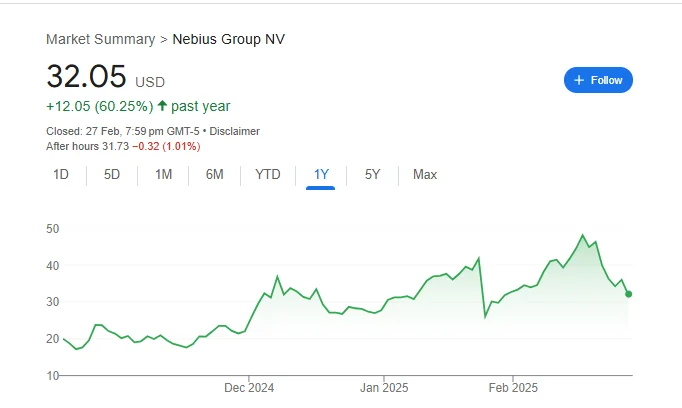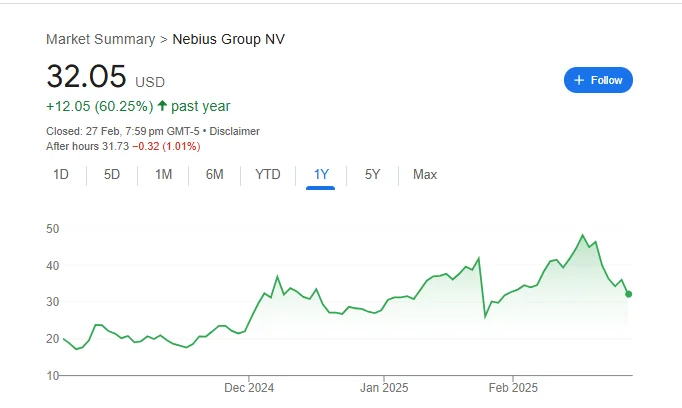Article Directory
When I first saw the headline, I had to read the numbers twice. A $17.4 billion deal. Not for a flashy new app, not for a social media giant, but for something far more fundamental: pure, unadulterated computational power. A relatively unknown company called Nebius Group, a name that wasn’t on the tip of everyone’s tongue last year, just signed a contract to supply AI infrastructure to… Microsoft. One of the very titans that was supposed to own this space.
This isn’t just another big-money tech deal. This is a tectonic shift. For years, we’ve talked about the “cloud” as this monolithic thing, a digital Olympus ruled by a few gods: Amazon, Google, and Microsoft. They offered a sprawling buffet of services, with the powerful GPUs needed for AI being just one dish among many. We accepted this as the natural order. But what we’re witnessing now is something different, something more specialized, and frankly, something far more exciting.
This is the story of how the very foundation of the AI revolution is being rebuilt, not by the old empires, but by a new class of master builders. And the shockwaves aren’t just rattling Silicon Valley; they’re reaching into the labs that could one day cure our diseases.
The New Power Grid for Intelligence
Think of the big cloud providers—the hyperscalers—as sprawling, all-purpose utility companies of the 2010s. They built the digital equivalent of the national power grid, providing everything from storage (water) to computing (electricity) to networking (roads). It was a brilliant, one-size-fits-all model. But building a true artificial intelligence requires a different kind of power plant. It demands an obsessive, singular focus on one thing: massively parallel computation.
This is where companies like Nebius and their contemporary, CoreWeave, come in. They aren't trying to be everything to everyone. They are laser-focused on building the world’s most efficient and powerful AI factories. They are the specialists, the master artisans who have perfected one crucial craft in an age of generalists. And suddenly, the emperors are coming to them.
Look at the evidence. In the same period Nebius landed its $17.4 billion Microsoft deal, CoreWeave locked in nearly $37 billion in commitments from OpenAI and Meta. What does it mean when the very companies defining the future of AI—Microsoft, Meta, OpenAI—are outsourcing the construction of their most critical infrastructure? It means the game has changed. They’ve realized that building and optimizing these next-generation data centers, packed with tens of thousands of Nvidia’s latest GPUs, is a specialized art form. Nebius claims it can deliver this power 20-25% more cheaply than traditional providers by optimizing everything from data center design to power efficiency.
This is the great unbundling of the cloud. It’s a paradigm shift from a general-purpose utility to a specialized, high-performance grid designed for a single purpose: creating intelligence. The question is no longer who owns the cloud, but who can provide the most potent and efficient fuel for AI? And right now, the answer isn’t coming from the names we all expected.

From Silicon to Cures
Now, here’s where the story gets truly profound. When I saw the news—like reports titled Biotech Boom: NBIS Surges After Microsoft‑NeoCloud AI Deal – Is a New Bull Market Ahead?—that the Nasdaq Biotechnology Index (confusingly, sometimes using the same NBIS ticker as Nebius Group) surged to a one-year high right after this deal was announced, I felt a genuine jolt of excitement. This is the convergence we’ve been talking about for years, happening in real-time. This isn’t just about making better search algorithms or more creative chatbots. This is about channeling this incredible new power into solving the most fundamental challenges of humanity.
For decades, drug discovery has been a slow, painstaking process of trial and error. Scientists would have to synthesize and test thousands of compounds to find one that might work. AI promises to change that. It uses immense computational power to simulate how millions of molecules might interact with proteins in the human body—in simpler terms, it’s like having a million brilliant chemists running a million experiments all at once, 24/7. The only thing holding this back has been access to the sheer, brute-force computing power required.
Until now.
This explosion of new, specialized GPU capacity from companies like Nebius isn’t just a corporate win, it’s a scientific breakthrough waiting to happen. It means the computational bottleneck that has constrained biotech research is beginning to dissolve. This massive new data center in New Jersey, filled with the most advanced Nvidia chips, isn't just a server farm; it's a future cradle of medical innovation. The AI models that will design new proteins, predict disease, and personalize medicine for your specific genetic code will be trained in facilities just like this. This is the kind of breakthrough that reminds me why I got into this field in the first place.
Of course, with this power comes immense responsibility. We have to ensure this new capacity is directed toward solving real problems and that its benefits are shared widely. But for the first time, the primary limitation on scientific discovery is shifting from a lack of computational tools to the limits of our own imagination. What questions will we finally be able to ask when we have a supercomputer in the cloud at our beck and call?
Some on Wall Street look at Nebius’s financials—a negative gross margin, staggering losses, a price-to-sales ratio near 100—and see a company that’s “prohibitively expensive.” I see something else. I see a company building a foundational utility for the next century. You don’t value the invention of the printing press based on the cost of the first book it prints. You value it for the Renaissance it unleashes. Nebius is building the presses, and a new renaissance in science is what they’re enabling.
The Starting Gun Has Fired
Let’s be clear about what this moment represents. The deals signed by Nebius and CoreWeave are not the finish line; they are the starting gun for a new era. We are witnessing the construction of the essential infrastructure—the roads, the bridges, the power plants—for the age of artificial intelligence. It's a messy, expensive, and high-risk endeavor, but it’s the necessary groundwork for everything that comes next. The true value won't be measured in quarterly earnings reports, but in the scientific discoveries, the creative breakthroughs, and the solutions to human problems that this new foundation will make possible. The builders are hard at work, and they are changing the world from the ground up.

